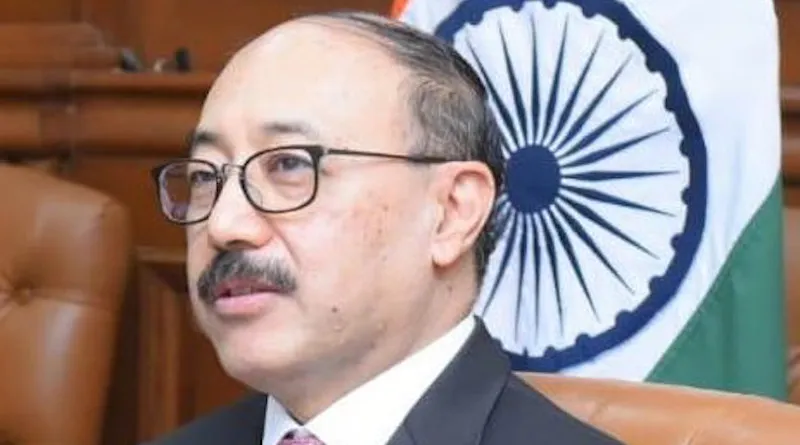India’s Foreign Secretary Visits Post-Coup Myanmar – Analysis

India’s Foreign Secretary Harsh Vardhan Shringla recently made a two-day visit to Myanmar, his first since the coup in February. As India and Myanmar share an almost 1,700 kilometer border, “peace and stability in Myanmar” is of importance to India, especially to the adjacent Indian northeast. A press release issued by the Indian Ministry of External Affairs (MEA) highlighted this, saying that “any developments in that country have a direct impact on India’s bordering regions.”
Shringla had meetings with Chairman of State Administrative Council Gen. Min Aung Hlaing and other senior officials, as well as those from the civil society and political parties including the National League for Democracy (NLD). New Delhi claims that in these meetings, Shringla reiterated India’s interest in “Myanmar’s return to democracy at the earliest; release of detainees and prisoners; resolution of issues through dialogue; and complete cessation of all violence.”
Although stability in the country is important to India, New Delhi’s position appears to focus on backing up the wider ASEAN position. ASEAN, in its leaders’ meeting in Jakarta in April, reached an agreement on five points with regard to Myanmar: ending violence, a constructive dialogue among all parties, a special ASEAN envoy to facilitate the dialogue, acceptance of aid and a visit by the envoy to Myanmar. The Indian MEA responded by saying it “welcome[d] the ASEAN initiative on Myanmar… Our diplomatic engagement with Myanmar will be aimed at strengthening these efforts.” The Quad meeting in September with the leaders of Australia, Japan and the United States, also made a pitch for the ASEAN initiative and called for “the urgent implementation of the ASEAN Five Point Consensus.”
Meanwhile, India has continued with humanitarian support for Myanmar, including in its fight against the COVID-19 pandemic. During his visit, Shringla handed over 1 million doses of “Made in India” vaccines to the Myanmar Red Cross Society. India also announced a grant of 10,000 tons of rice and wheat to Myanmar.
Shringla also brought up issues that pertain more directly to India’s security. Myanmar’s role is critical with regard to the recent militant ambush in Churachandpur district of the Indian state of Manipur, the worst in recent memory. The ambush killed an Assam Rifles (AR) commanding officer, as well as his wife and young son, along with four other AR personnel. There have also been other difficulties in the area, including mob violence that resulted in the killing of four and injuring of more than a dozen over local protests demanding Inner Line Permits (ILPs). ILPs are Indian government restrictions on non-locals traveling to the region; neighboring Indian states like Nagaland and Arunachal Pradesh have ILP restrictions. The demand for such ILPs have come up periodically in Manipur, too. All of these disturbances are a concern to New Delhi. Both India and Myanmar “reiterated their commitment to ensure that their respective territories would not be allowed to be used for any activities inimical to the other.”
While Shringla may have returned satisfied with the visit, having conveyed India’s wish list such as the need to return to democracy, it is not clear that the ruling regime under Gen. Min Aung Hlaing, shares the same view. For instance, on India’s plea for the return of democracy, Myanmar’s official media reportedly stated that the two leaders talked about “discharging of State responsibilities by the ‘Tatmadaw’ [military] under the constitution (2008) due to voting fraud in the 2020 general election, terror acts of terrorist groups in the country, efforts for counter-terrorism, response to terror acts against education and health staff and efforts for ensuring peace and stability in the border regions of both countries.”
Aung San Suu Kyi’s NLD had won the 2020 general elections, securing another term, but the military called the election result fraudulent, saying “it was not free and fair,” although this charge is yet to be substantiated. Meanwhile, the Indian delegation’s request to meet Suu Kyi was rejected by the Myanmar authorities. Suu Kyi is currently serving time under a four-year term of imprisonment and awaiting another trial that might impose more severe punishments. India was not unique in being refused a meeting – special envoys from Japan and China, as well as ASEAN and the U.N. were also denied permission to meet with Suu Kyi.
India’s options are limited, and somewhat grimmer than the rest of the international community, however While the West has isolated Myanmar following the military takeover earlier in the year, New Delhi feels more constrained. For India, Myanmar is a neighbor with which it shares a long border through a restive region. Moreover, India is also worried that China may take advantage of the situation if Myanmar is further isolated. Thus, New Delhi feels it does not have the option of cutting off Myanmar, as the West has done.
Indrani Bagchi, a prominent Indian foreign policy correspondent, noted in her recent column that India is adopting a “twin-track” approach, “walking a fine balance between engaging the immediate eastern neighbour while pushing it towards restoration of democracy.” For instance, in international platforms such as the U.N. Human Rights Council, India has made a case against sanctions even as it continues to express concern over the developments in Myanmar.
